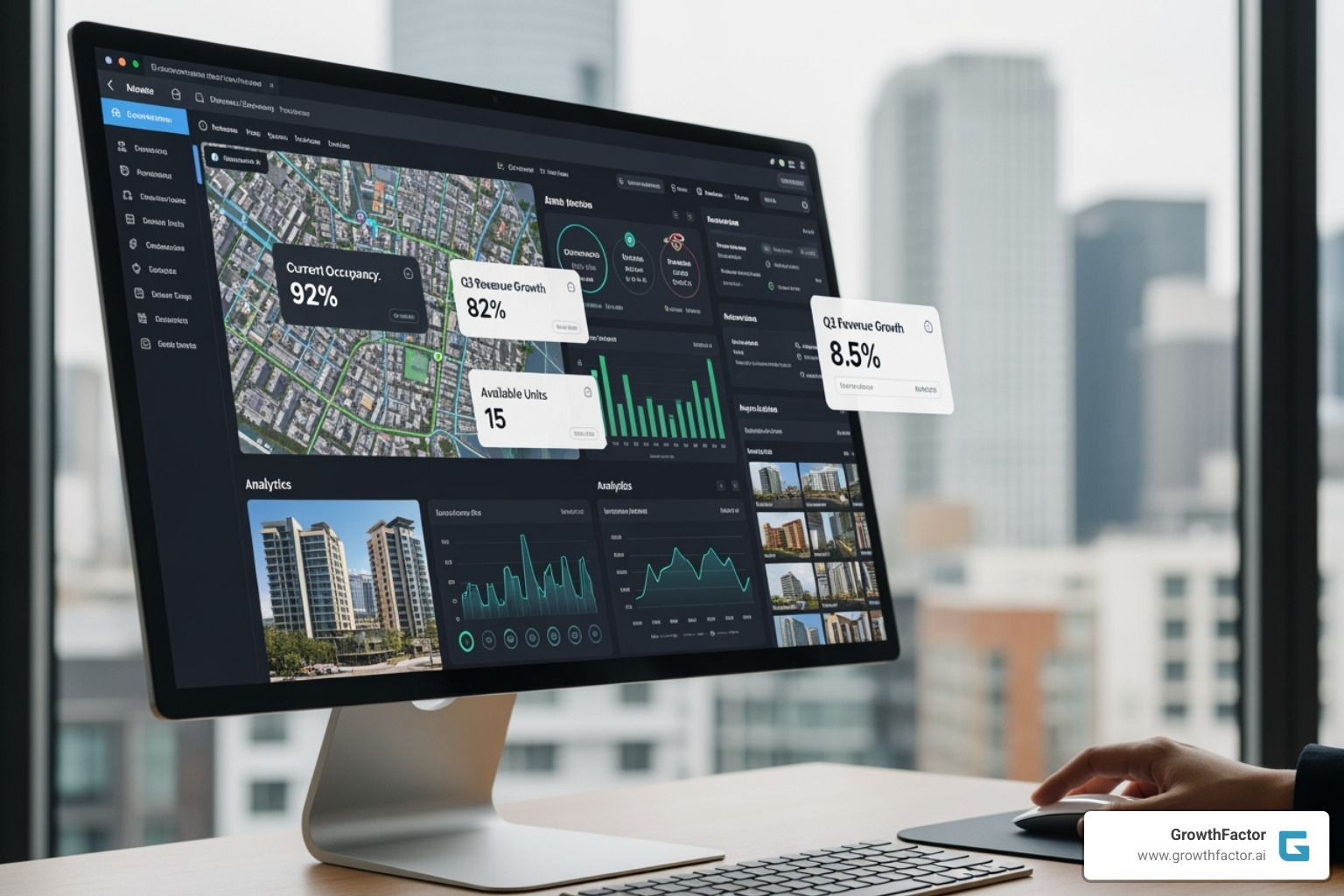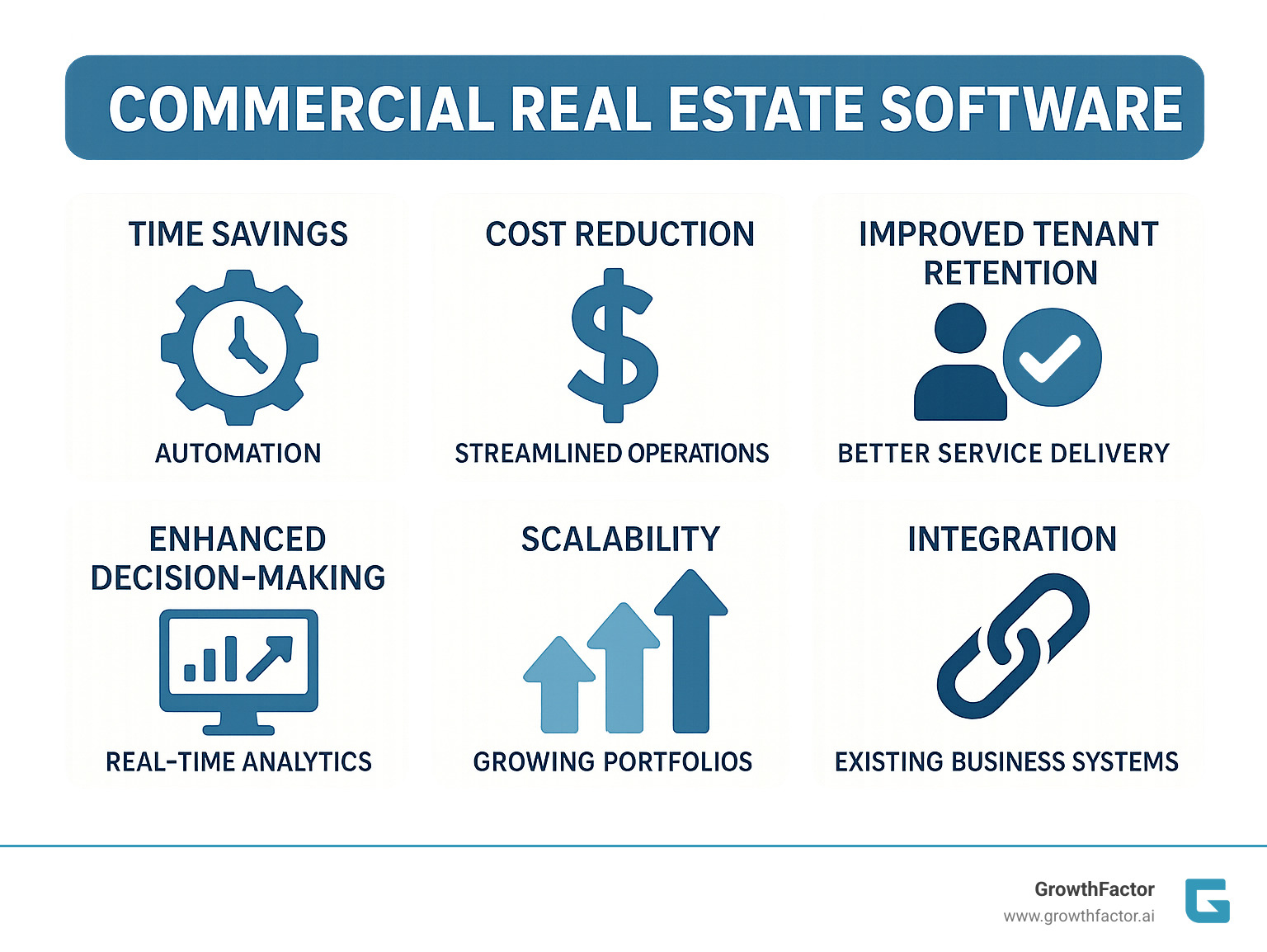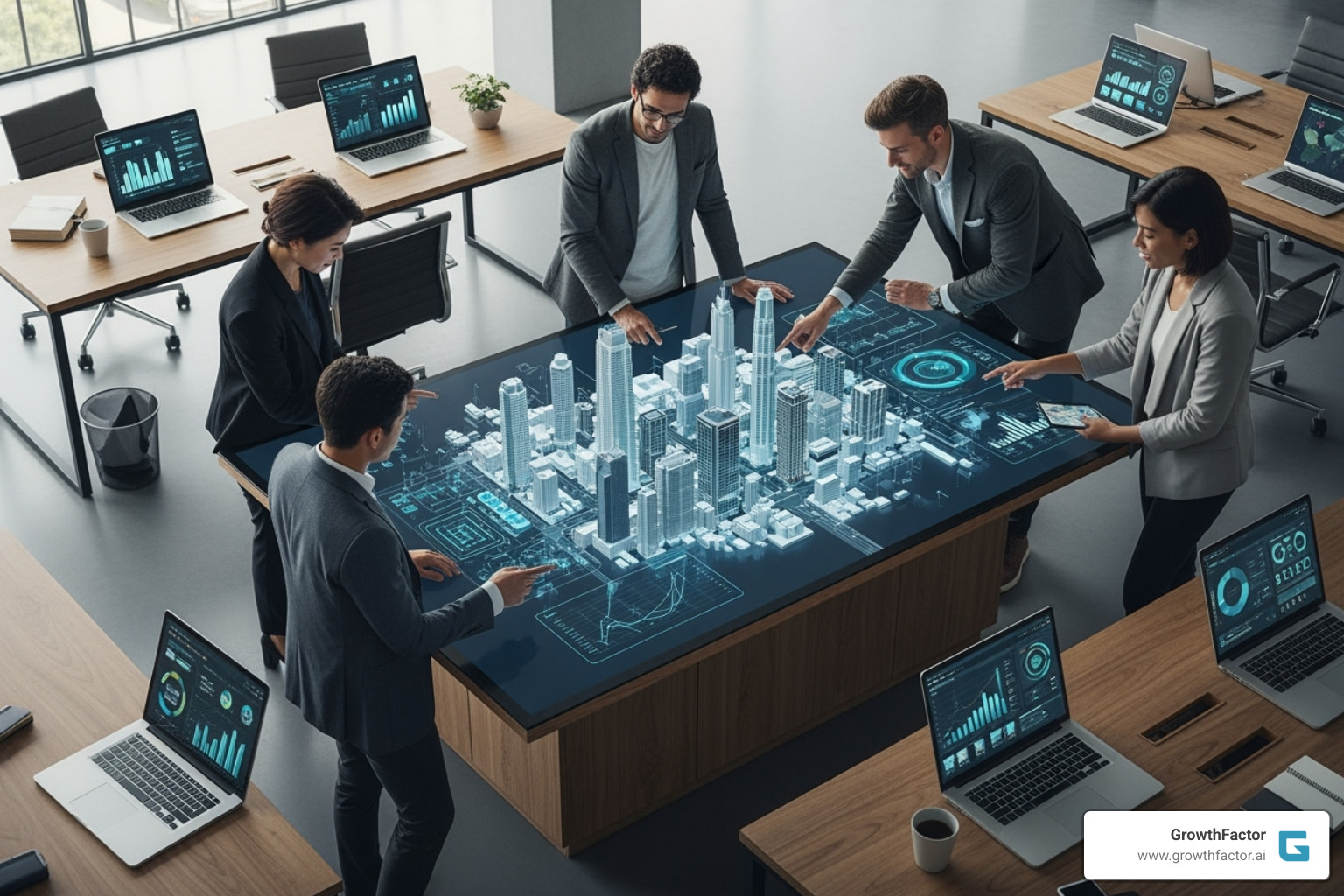Smart Moves: Choosing the Right Commercial Real Estate Software
Written by: Clyde Christian Anderson
The Modern CRE Manager's Toolkit

Commercial real estate software has become essential for property managers, owners, and brokers who need to streamline operations, maximize revenue, and make data-driven decisions across their portfolios.
Managing commercial real estate requires wearing many hats - from accounting and marketing to maintenance and tenant relations. The industry has shifted dramatically from manual spreadsheets and sticky-note prospecting to integrated technology platforms that automate complex lease calculations, track key dates, and provide real-time portfolio insights.
Modern commercial real estate software differs significantly from residential solutions by handling complex lease clauses, CAM reconciliation, percentage rent calculations, and multi-tenant scenarios. These platforms typically integrate lease administration, financial management, tenant portals, and building operations into one comprehensive system.
As Clyde Christian Anderson, Founder and CEO of GrowthFactor.ai, I've seen how the right commercial real estate software can transform operations - from my early days analyzing real estate in my family's retail business to helping clients open up millions in revenue through data-driven location decisions. The key is finding platforms that automate repetitive tasks while providing actionable insights for strategic decision-making.

Commercial real estate software terms to remember:
Evaluating the Best Commercial Real Estate Software
When you're looking for the perfect commercial real estate software, you're not just shopping for a basic tool – you're investing in a comprehensive solution that can handle the intricate dance of managing commercial properties. Unlike residential management, where you might just collect rent and handle the occasional repair, commercial real estate demands a sophisticated approach to maximize every square foot and nurture every tenant relationship.
Core Functionalities vs. Residential Software
The foundation of any solid commercial property management software includes four essential pillars: robust lease administration, user-friendly tenant portals, streamlined maintenance management, and comprehensive financial reporting. These core functions keep your properties humming along smoothly day after day.
But here's where things get interesting – and where commercial software really earns its keep. While residential leases are typically straightforward (think standard one-year agreements), commercial leases are intricate puzzles with complex lease clauses, detailed Common Area Maintenance (CAM) reconciliation, percentage rent calculations tied to tenant sales performance, and strategic tenant mix analysis to create thriving business environments.

The payoff for using specialized commercial software is substantial. We've seen property managers save over 35 hours of administrative work per week by switching from generic tools to purpose-built solutions. One team reported achieving 90% savings in property management expenses – dropping from $600-$1,000 per property monthly to a fraction of that cost. Another client experienced a 100% improvement in accuracy for lease calculations, plus an additional $0.14 per square foot in recoveries with zero slippage on common area expenses.
These aren't just nice numbers to put in a presentation – they represent real operational efficiency, meaningful cost reduction, and precious time savings that let you focus on growing your portfolio instead of drowning in spreadsheets.
For more insights on how modern technology is changing property management, check out more info about AI property management tools.
Must-Have Features for Lease and Financial Management
Getting lease and financial management right is absolutely critical – these are the nuts and bolts that hold your entire operation together.
On the lease management side, you need software that can smoothly handle abstracting key dates like lease commencements, renewals, and option periods. Automated escalations take the guesswork out of rent increases, while comprehensive renewal tracking ensures you never miss an opportunity to keep a valuable tenant. Imagine walking into a tenant meeting with every lease detail at your fingertips instead of frantically searching through filing cabinets!
The results speak for themselves: proper lease management leads to a 100% improvement in accuracy, plus an average boost of $0.14 per square foot in recoveries with zero slippage on common area and capital expenditure recoveries. It's like having a financial safety net that actually catches money instead of letting it slip through the cracks.
For those curious about cutting-edge lease management technology, there's more info about AI for Lease Management.
Your financial management toolkit needs to go well beyond basic bookkeeping. A robust general ledger forms the foundation, supported by streamlined accounts payable/receivable processes. Budgeting & forecasting tools should connect seamlessly with your leasing and asset management data for more accurate financial planning. Job costing capabilities let you track expenses against specific projects, while specialized features handle unique commercial needs like CAM calculations, leasehold improvements, and year-end depreciation.
Don't overlook building operations – these features keep your tenants happy and your assets in peak condition. Efficient work order management handles maintenance requests promptly, while comprehensive vendor tracking helps you manage service providers effectively. Property inspections capabilities ensure nothing falls through the cracks, and preventive maintenance scheduling helps you stay ahead of problems before they become expensive headaches.
Different property types have unique needs worth considering. Office properties benefit from features like space planning and operating expense recovery tools. Retail properties need percentage rent calculations, co-tenancy clause management, and tenant mix analysis. Industrial properties require triple net lease handling, large-scale tenant onboarding, and equipment maintenance tracking.
The Strategic Role of AI, Data, and Integrations in Commercial Real Estate Software
Today's commercial real estate software isn't just about managing what you already have – it's about predicting what's coming next and optimizing for future success. This is where AI, data analytics, and smart integrations become game-changers.

AI and automation are revolutionizing how we work. AI lease abstraction can analyze complex commercial leases and extract key information with remarkable accuracy, turning mountains of unstructured data into actionable insights. Predictive analytics help identify potential buyers, sellers, and tenants before your competitors spot them. Automated workflows streamline everything from initial inquiries to signed contracts.
This power is demonstrated by AI agents that automate qualification and evaluation processes, allowing teams to evaluate significantly more sites efficiently. This kind of efficiency boost isn't just convenient; it's a competitive advantage that can make or break deals in fast-moving markets.
For a broader look at AI's impact on real estate, explore more info about AI for Real Estate.
Portfolio analysis capabilities provide the big-picture view you need for strategic decision-making. Centralized data creates a single source of truth across all your properties, regardless of type or location. This feeds into powerful performance dashboards that give you crystal-clear insights into your assets' health and help drive NOI maximization strategies. Imagine having all your building, suite, and lease information accessible anytime, anywhere – that's the power of modern portfolio management.
To dive deeper into portfolio strategy, check out more info about Commercial Real Estate Portfolio Management Software.
Integrations are the invisible threads that weave your entire tech stack together. Look for API access that lets your commercial real estate software connect seamlessly with your CRM, accounting software, and other essential tools. This eliminates data silos and provides a holistic view of your operations.
Marketing and leasing features round out the strategic toolkit. Listing syndication pushes your available spaces to top marketplaces, boosting occupancy rates. Virtual tours – improved by platforms like Matterport – provide immersive experiences for potential tenants. Robust lead tracking ensures no opportunity slips through the cracks, while integrated marketing data helps accelerate leasing in competitive markets.
How to Choose Your Commercial Real Estate Software: Security, Usability, and Tenant Experience
Selecting the right commercial real estate software is one of the most important technology decisions you'll make. It's definitely not a one-size-fits-all situation, and getting it wrong can be costly in both time and money.
Property type considerations should drive your decision-making process. Office properties need software that excels at space utilization tracking, complex multi-tenant lease management, and tenant communication tools for building amenities. Retail properties require robust foot traffic analysis, seamless integration with sales data for percentage rent calculations, and sophisticated tenant mix management tools. Industrial properties benefit from software that streamlines logistics coordination, manages large-scale maintenance operations, and efficiently tracks equipment and inventory.
Data security isn't negotiable when you're handling sensitive financial information, lease agreements, and tenant data. Your chosen platform must meet strict compliance standards like SOC II or GDPR, employ strong data encryption protocols, offer granular user permissions for access control, and maintain comprehensive audit trails for accountability. A data breach isn't just embarrassing – it can be financially devastating and legally problematic.
Tenant experience directly impacts retention rates and property values. Look for user-friendly tenant portals where tenants can pay rent, submit maintenance requests, and access important documents. Mobile apps provide convenience for on-the-go interactions, while integrated communication tools ensure smooth dialogue between property managers and tenants. Advanced platforms even offer amenity booking features that make commercial spaces more attractive and functional. For insights on elevating tenant experience, HqO offers valuable expertise in this area.
Vendor selection comes down to practical considerations that affect your daily operations. The software must offer scalability to grow with your portfolio, whether you're managing a handful of properties or billions of square feet. Excellent customer support is essential – you need responsive help when issues arise. An intuitive user interface determines whether your team will actually use the system effectively or fight it every day. Finally, a well-structured onboarding process ensures smooth implementation without disrupting your ongoing operations.
Making Your Final Decision
Choosing the right commercial real estate software isn't just about buying another tool for your tech stack. It's about making a strategic investment that will shape your portfolio's future and transform how your team operates day-to-day.
Think about it this way: every hour your team spends wrestling with spreadsheets or hunting down lease information is an hour they're not spending on growing your business. The right software changes that equation completely.
The most successful property managers focus on platforms that can genuinely automate repetitive tasks while providing actionable data for smarter decision-making. You want software that's flexible enough to adapt to your specific property types, whether you're managing sleek office towers, busy retail centers, or sprawling industrial complexes. The goal is simple: move from constantly putting out fires to proactively building value.
Here's what we've learned matters most: your software should feel like it's working with you, not against you. It should make complex lease calculations feel effortless, turn tenant communication into a breeze, and give you the insights you need to maximize every square foot of your portfolio.
At GrowthFactor, we've witnessed how AI-powered platforms are revolutionizing the industry, particularly in areas like retail site selection and deal tracking. Our AI Agent Waldo demonstrates this perfectly - it enables teams to evaluate five times more sites efficiently by automating those time-consuming qualification and evaluation processes that used to eat up entire days.
We believe the future belongs to commercial real estate professionals who accept technology to make smarter, faster decisions. It's not about replacing human expertise; it's about amplifying it.
For teams ready to transform their operations, we offer flexible plans designed to fit different needs and budgets. Our Core plan starts at $500, with our Growth plan at $1,500, and comprehensive Enterprise plans also available for larger portfolios.
The bottom line? The right commercial real estate software will pay for itself many times over through improved efficiency, better tenant retention, and smarter strategic decisions.
Ready to see what's possible? Find how an all-in-one AI platform can transform your real estate strategy and take your business to the next level.
Citations
The human algorithm
Request Your demo
Schedule meeting
Or submit your information below and we'll be in touch to schedule.


